Foucault, Goffman, and Power: Institutions and Service User Lives
VerifiedAdded on 2020/12/09
|9
|2736
|338
Essay
AI Summary
This essay provides a comprehensive overview of power dynamics in social institutions, focusing on the contributions of Michel Foucault and Erving Goffman. The essay begins by defining power from sociological perspectives, highlighting Foucault's view of power as a productive force and Goffman's insights into its manifestations. It examines how power operates within institutions, particularly in service settings, and how it shapes the behavior, performance, and daily experiences of individuals, including both service providers and users. The analysis includes a comparison of Foucault and Goffman's theories, emphasizing their distinct conceptions of how individual identities are formed through power and knowledge. The essay explores the implications of these theories for healthcare, disciplinary practices, and the control of individuals within institutions. It concludes by summarizing the key arguments and reinforcing the fundamental role of power in shaping social structures and individual experiences. The essay also touches upon how knowledge and power are intertwined, with knowledge often arising from power dynamics and, in turn, being used to exercise power, as well as how power relations shape the lives of service users.
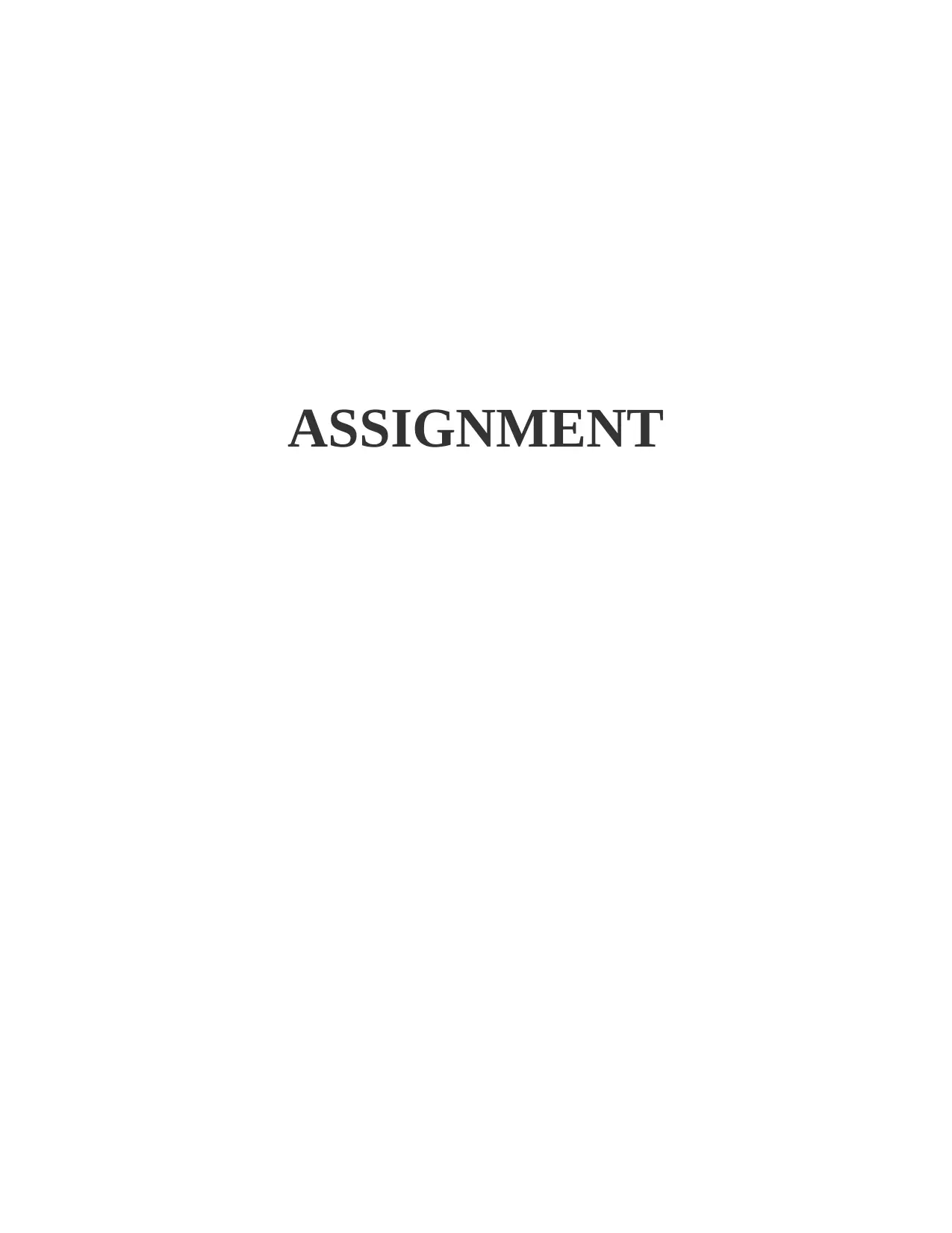
ASSIGNMENT
Paraphrase This Document
Need a fresh take? Get an instant paraphrase of this document with our AI Paraphraser
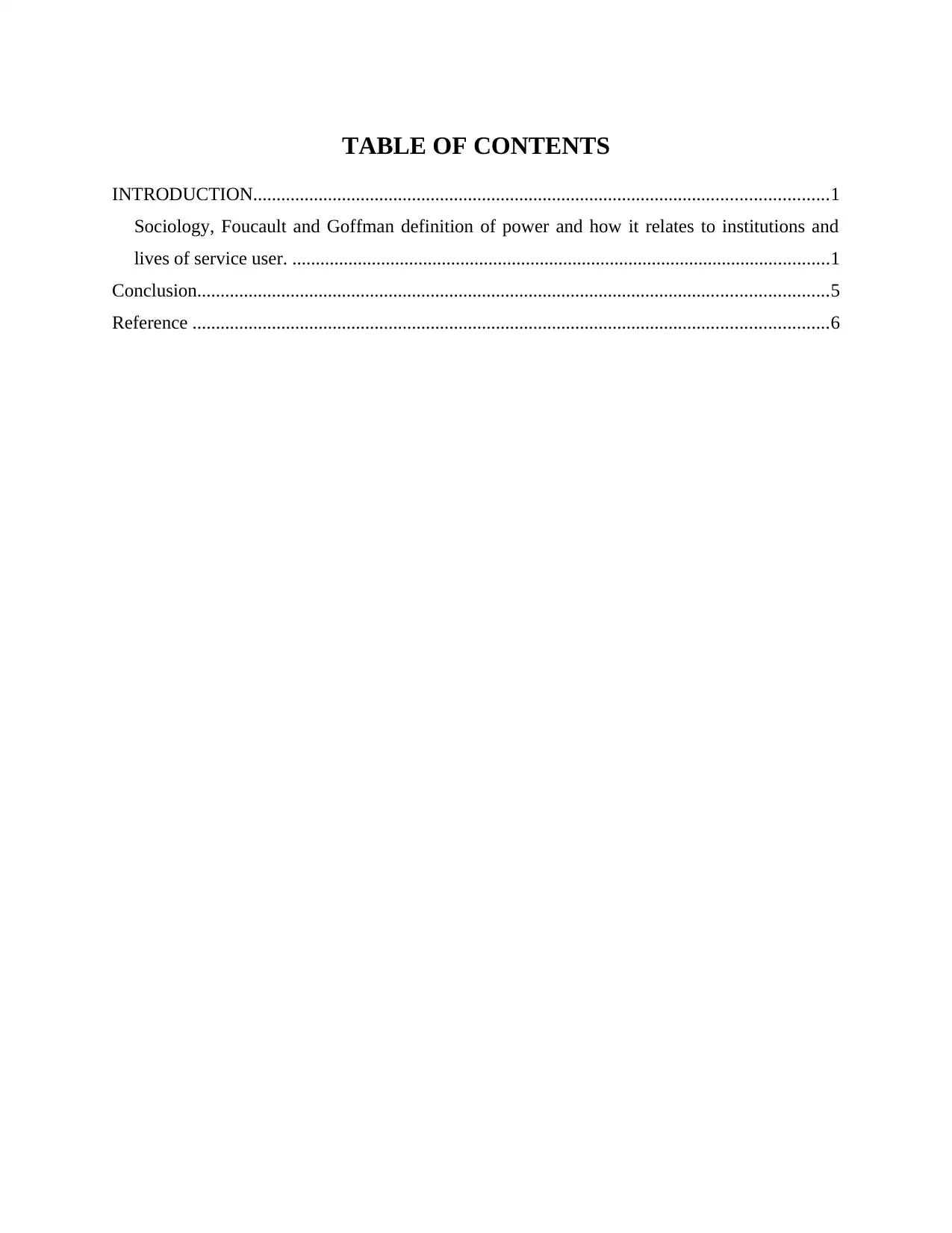
TABLE OF CONTENTS
INTRODUCTION...........................................................................................................................1
Sociology, Foucault and Goffman definition of power and how it relates to institutions and
lives of service user. ...................................................................................................................1
Conclusion.......................................................................................................................................5
Reference ........................................................................................................................................6
INTRODUCTION...........................................................................................................................1
Sociology, Foucault and Goffman definition of power and how it relates to institutions and
lives of service user. ...................................................................................................................1
Conclusion.......................................................................................................................................5
Reference ........................................................................................................................................6
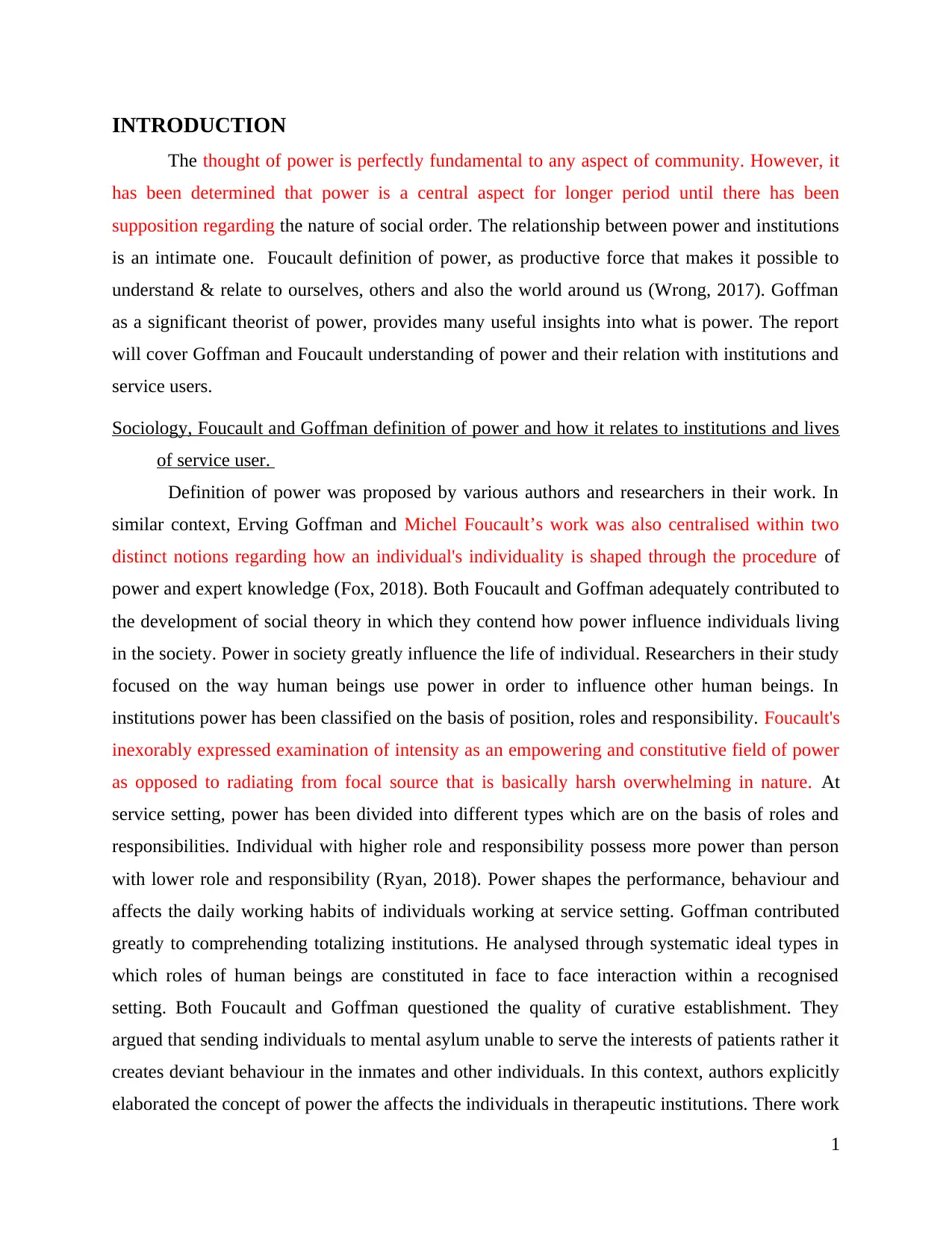
INTRODUCTION
The thought of power is perfectly fundamental to any aspect of community. However, it
has been determined that power is a central aspect for longer period until there has been
supposition regarding the nature of social order. The relationship between power and institutions
is an intimate one. Foucault definition of power, as productive force that makes it possible to
understand & relate to ourselves, others and also the world around us (Wrong, 2017). Goffman
as a significant theorist of power, provides many useful insights into what is power. The report
will cover Goffman and Foucault understanding of power and their relation with institutions and
service users.
Sociology, Foucault and Goffman definition of power and how it relates to institutions and lives
of service user.
Definition of power was proposed by various authors and researchers in their work. In
similar context, Erving Goffman and Michel Foucault’s work was also centralised within two
distinct notions regarding how an individual's individuality is shaped through the procedure of
power and expert knowledge (Fox, 2018). Both Foucault and Goffman adequately contributed to
the development of social theory in which they contend how power influence individuals living
in the society. Power in society greatly influence the life of individual. Researchers in their study
focused on the way human beings use power in order to influence other human beings. In
institutions power has been classified on the basis of position, roles and responsibility. Foucault's
inexorably expressed examination of intensity as an empowering and constitutive field of power
as opposed to radiating from focal source that is basically harsh overwhelming in nature. At
service setting, power has been divided into different types which are on the basis of roles and
responsibilities. Individual with higher role and responsibility possess more power than person
with lower role and responsibility (Ryan, 2018). Power shapes the performance, behaviour and
affects the daily working habits of individuals working at service setting. Goffman contributed
greatly to comprehending totalizing institutions. He analysed through systematic ideal types in
which roles of human beings are constituted in face to face interaction within a recognised
setting. Both Foucault and Goffman questioned the quality of curative establishment. They
argued that sending individuals to mental asylum unable to serve the interests of patients rather it
creates deviant behaviour in the inmates and other individuals. In this context, authors explicitly
elaborated the concept of power the affects the individuals in therapeutic institutions. There work
1
The thought of power is perfectly fundamental to any aspect of community. However, it
has been determined that power is a central aspect for longer period until there has been
supposition regarding the nature of social order. The relationship between power and institutions
is an intimate one. Foucault definition of power, as productive force that makes it possible to
understand & relate to ourselves, others and also the world around us (Wrong, 2017). Goffman
as a significant theorist of power, provides many useful insights into what is power. The report
will cover Goffman and Foucault understanding of power and their relation with institutions and
service users.
Sociology, Foucault and Goffman definition of power and how it relates to institutions and lives
of service user.
Definition of power was proposed by various authors and researchers in their work. In
similar context, Erving Goffman and Michel Foucault’s work was also centralised within two
distinct notions regarding how an individual's individuality is shaped through the procedure of
power and expert knowledge (Fox, 2018). Both Foucault and Goffman adequately contributed to
the development of social theory in which they contend how power influence individuals living
in the society. Power in society greatly influence the life of individual. Researchers in their study
focused on the way human beings use power in order to influence other human beings. In
institutions power has been classified on the basis of position, roles and responsibility. Foucault's
inexorably expressed examination of intensity as an empowering and constitutive field of power
as opposed to radiating from focal source that is basically harsh overwhelming in nature. At
service setting, power has been divided into different types which are on the basis of roles and
responsibilities. Individual with higher role and responsibility possess more power than person
with lower role and responsibility (Ryan, 2018). Power shapes the performance, behaviour and
affects the daily working habits of individuals working at service setting. Goffman contributed
greatly to comprehending totalizing institutions. He analysed through systematic ideal types in
which roles of human beings are constituted in face to face interaction within a recognised
setting. Both Foucault and Goffman questioned the quality of curative establishment. They
argued that sending individuals to mental asylum unable to serve the interests of patients rather it
creates deviant behaviour in the inmates and other individuals. In this context, authors explicitly
elaborated the concept of power the affects the individuals in therapeutic institutions. There work
1
⊘ This is a preview!⊘
Do you want full access?
Subscribe today to unlock all pages.

Trusted by 1+ million students worldwide
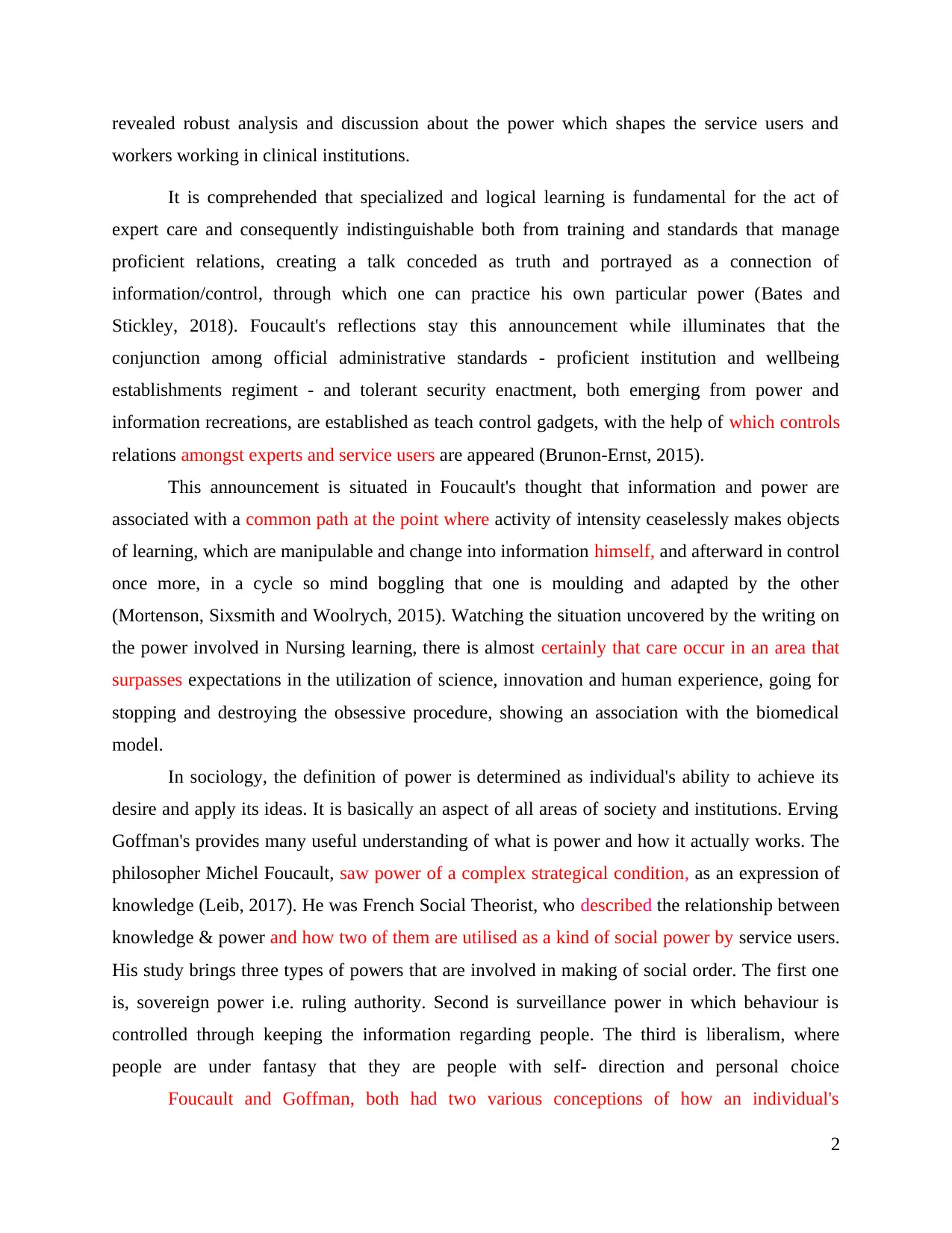
revealed robust analysis and discussion about the power which shapes the service users and
workers working in clinical institutions.
It is comprehended that specialized and logical learning is fundamental for the act of
expert care and consequently indistinguishable both from training and standards that manage
proficient relations, creating a talk conceded as truth and portrayed as a connection of
information/control, through which one can practice his own particular power (Bates and
Stickley, 2018). Foucault's reflections stay this announcement while illuminates that the
conjunction among official administrative standards - proficient institution and wellbeing
establishments regiment - and tolerant security enactment, both emerging from power and
information recreations, are established as teach control gadgets, with the help of which controls
relations amongst experts and service users are appeared (Brunon-Ernst, 2015).
This announcement is situated in Foucault's thought that information and power are
associated with a common path at the point where activity of intensity ceaselessly makes objects
of learning, which are manipulable and change into information himself, and afterward in control
once more, in a cycle so mind boggling that one is moulding and adapted by the other
(Mortenson, Sixsmith and Woolrych, 2015). Watching the situation uncovered by the writing on
the power involved in Nursing learning, there is almost certainly that care occur in an area that
surpasses expectations in the utilization of science, innovation and human experience, going for
stopping and destroying the obsessive procedure, showing an association with the biomedical
model.
In sociology, the definition of power is determined as individual's ability to achieve its
desire and apply its ideas. It is basically an aspect of all areas of society and institutions. Erving
Goffman's provides many useful understanding of what is power and how it actually works. The
philosopher Michel Foucault, saw power of a complex strategical condition, as an expression of
knowledge (Leib, 2017). He was French Social Theorist, who described the relationship between
knowledge & power and how two of them are utilised as a kind of social power by service users.
His study brings three types of powers that are involved in making of social order. The first one
is, sovereign power i.e. ruling authority. Second is surveillance power in which behaviour is
controlled through keeping the information regarding people. The third is liberalism, where
people are under fantasy that they are people with self- direction and personal choice
Foucault and Goffman, both had two various conceptions of how an individual's
2
workers working in clinical institutions.
It is comprehended that specialized and logical learning is fundamental for the act of
expert care and consequently indistinguishable both from training and standards that manage
proficient relations, creating a talk conceded as truth and portrayed as a connection of
information/control, through which one can practice his own particular power (Bates and
Stickley, 2018). Foucault's reflections stay this announcement while illuminates that the
conjunction among official administrative standards - proficient institution and wellbeing
establishments regiment - and tolerant security enactment, both emerging from power and
information recreations, are established as teach control gadgets, with the help of which controls
relations amongst experts and service users are appeared (Brunon-Ernst, 2015).
This announcement is situated in Foucault's thought that information and power are
associated with a common path at the point where activity of intensity ceaselessly makes objects
of learning, which are manipulable and change into information himself, and afterward in control
once more, in a cycle so mind boggling that one is moulding and adapted by the other
(Mortenson, Sixsmith and Woolrych, 2015). Watching the situation uncovered by the writing on
the power involved in Nursing learning, there is almost certainly that care occur in an area that
surpasses expectations in the utilization of science, innovation and human experience, going for
stopping and destroying the obsessive procedure, showing an association with the biomedical
model.
In sociology, the definition of power is determined as individual's ability to achieve its
desire and apply its ideas. It is basically an aspect of all areas of society and institutions. Erving
Goffman's provides many useful understanding of what is power and how it actually works. The
philosopher Michel Foucault, saw power of a complex strategical condition, as an expression of
knowledge (Leib, 2017). He was French Social Theorist, who described the relationship between
knowledge & power and how two of them are utilised as a kind of social power by service users.
His study brings three types of powers that are involved in making of social order. The first one
is, sovereign power i.e. ruling authority. Second is surveillance power in which behaviour is
controlled through keeping the information regarding people. The third is liberalism, where
people are under fantasy that they are people with self- direction and personal choice
Foucault and Goffman, both had two various conceptions of how an individual's
2
Paraphrase This Document
Need a fresh take? Get an instant paraphrase of this document with our AI Paraphraser
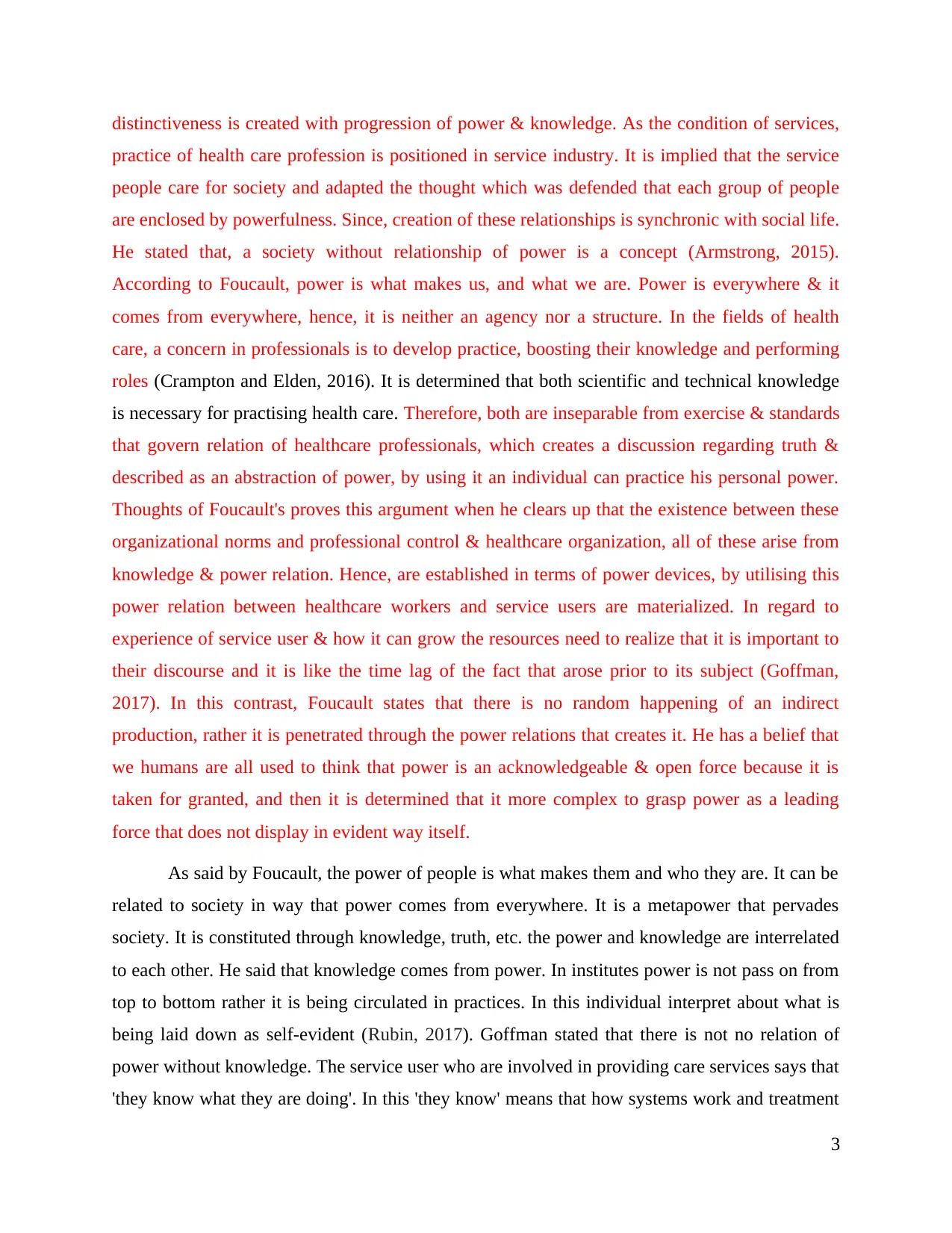
distinctiveness is created with progression of power & knowledge. As the condition of services,
practice of health care profession is positioned in service industry. It is implied that the service
people care for society and adapted the thought which was defended that each group of people
are enclosed by powerfulness. Since, creation of these relationships is synchronic with social life.
He stated that, a society without relationship of power is a concept (Armstrong, 2015).
According to Foucault, power is what makes us, and what we are. Power is everywhere & it
comes from everywhere, hence, it is neither an agency nor a structure. In the fields of health
care, a concern in professionals is to develop practice, boosting their knowledge and performing
roles (Crampton and Elden, 2016). It is determined that both scientific and technical knowledge
is necessary for practising health care. Therefore, both are inseparable from exercise & standards
that govern relation of healthcare professionals, which creates a discussion regarding truth &
described as an abstraction of power, by using it an individual can practice his personal power.
Thoughts of Foucault's proves this argument when he clears up that the existence between these
organizational norms and professional control & healthcare organization, all of these arise from
knowledge & power relation. Hence, are established in terms of power devices, by utilising this
power relation between healthcare workers and service users are materialized. In regard to
experience of service user & how it can grow the resources need to realize that it is important to
their discourse and it is like the time lag of the fact that arose prior to its subject (Goffman,
2017). In this contrast, Foucault states that there is no random happening of an indirect
production, rather it is penetrated through the power relations that creates it. He has a belief that
we humans are all used to think that power is an acknowledgeable & open force because it is
taken for granted, and then it is determined that it more complex to grasp power as a leading
force that does not display in evident way itself.
As said by Foucault, the power of people is what makes them and who they are. It can be
related to society in way that power comes from everywhere. It is a metapower that pervades
society. It is constituted through knowledge, truth, etc. the power and knowledge are interrelated
to each other. He said that knowledge comes from power. In institutes power is not pass on from
top to bottom rather it is being circulated in practices. In this individual interpret about what is
being laid down as self-evident (Rubin, 2017). Goffman stated that there is not no relation of
power without knowledge. The service user who are involved in providing care services says that
'they know what they are doing'. In this 'they know' means that how systems work and treatment
3
practice of health care profession is positioned in service industry. It is implied that the service
people care for society and adapted the thought which was defended that each group of people
are enclosed by powerfulness. Since, creation of these relationships is synchronic with social life.
He stated that, a society without relationship of power is a concept (Armstrong, 2015).
According to Foucault, power is what makes us, and what we are. Power is everywhere & it
comes from everywhere, hence, it is neither an agency nor a structure. In the fields of health
care, a concern in professionals is to develop practice, boosting their knowledge and performing
roles (Crampton and Elden, 2016). It is determined that both scientific and technical knowledge
is necessary for practising health care. Therefore, both are inseparable from exercise & standards
that govern relation of healthcare professionals, which creates a discussion regarding truth &
described as an abstraction of power, by using it an individual can practice his personal power.
Thoughts of Foucault's proves this argument when he clears up that the existence between these
organizational norms and professional control & healthcare organization, all of these arise from
knowledge & power relation. Hence, are established in terms of power devices, by utilising this
power relation between healthcare workers and service users are materialized. In regard to
experience of service user & how it can grow the resources need to realize that it is important to
their discourse and it is like the time lag of the fact that arose prior to its subject (Goffman,
2017). In this contrast, Foucault states that there is no random happening of an indirect
production, rather it is penetrated through the power relations that creates it. He has a belief that
we humans are all used to think that power is an acknowledgeable & open force because it is
taken for granted, and then it is determined that it more complex to grasp power as a leading
force that does not display in evident way itself.
As said by Foucault, the power of people is what makes them and who they are. It can be
related to society in way that power comes from everywhere. It is a metapower that pervades
society. It is constituted through knowledge, truth, etc. the power and knowledge are interrelated
to each other. He said that knowledge comes from power. In institutes power is not pass on from
top to bottom rather it is being circulated in practices. In this individual interpret about what is
being laid down as self-evident (Rubin, 2017). Goffman stated that there is not no relation of
power without knowledge. The service user who are involved in providing care services says that
'they know what they are doing'. In this 'they know' means that how systems work and treatment
3
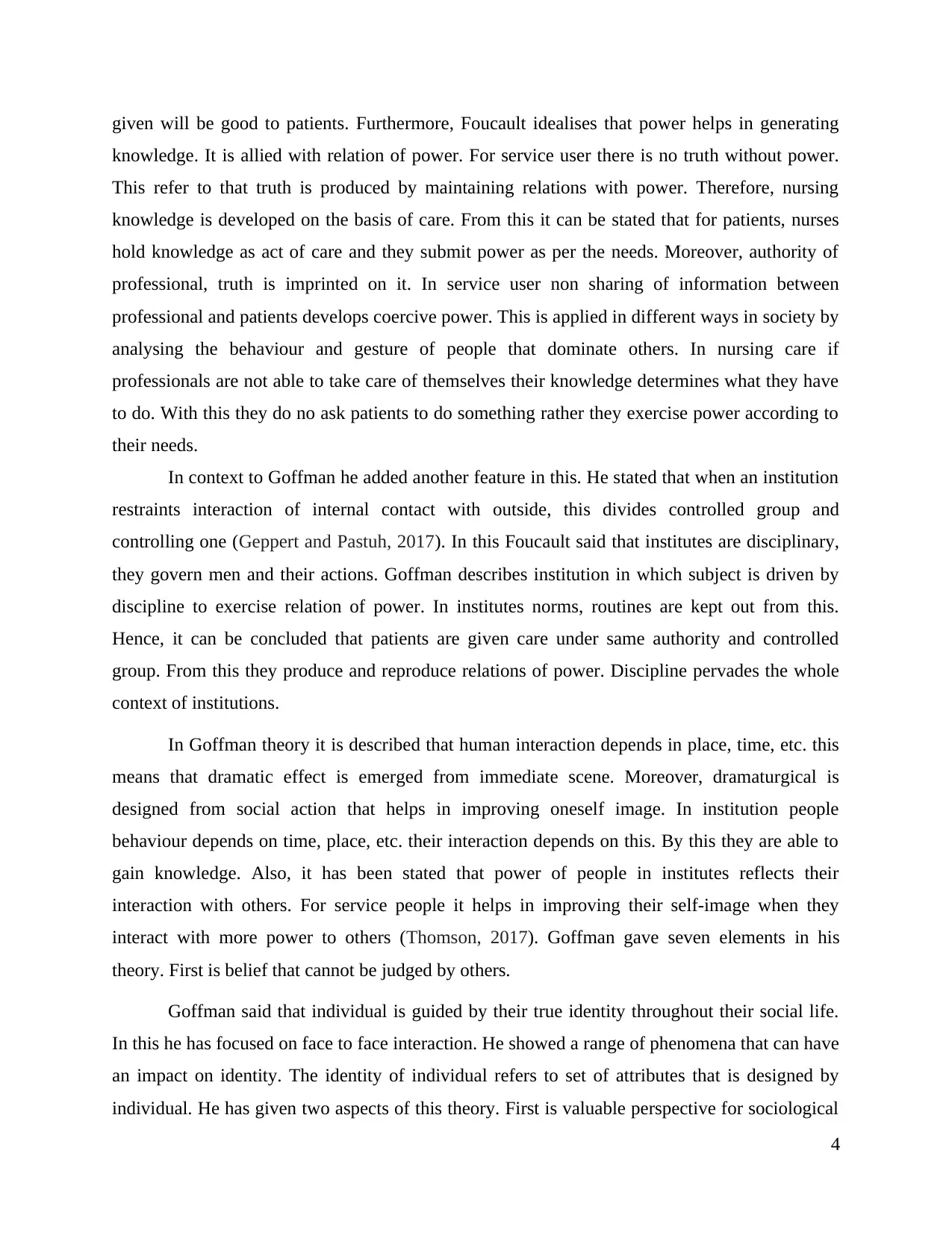
given will be good to patients. Furthermore, Foucault idealises that power helps in generating
knowledge. It is allied with relation of power. For service user there is no truth without power.
This refer to that truth is produced by maintaining relations with power. Therefore, nursing
knowledge is developed on the basis of care. From this it can be stated that for patients, nurses
hold knowledge as act of care and they submit power as per the needs. Moreover, authority of
professional, truth is imprinted on it. In service user non sharing of information between
professional and patients develops coercive power. This is applied in different ways in society by
analysing the behaviour and gesture of people that dominate others. In nursing care if
professionals are not able to take care of themselves their knowledge determines what they have
to do. With this they do no ask patients to do something rather they exercise power according to
their needs.
In context to Goffman he added another feature in this. He stated that when an institution
restraints interaction of internal contact with outside, this divides controlled group and
controlling one (Geppert and Pastuh, 2017). In this Foucault said that institutes are disciplinary,
they govern men and their actions. Goffman describes institution in which subject is driven by
discipline to exercise relation of power. In institutes norms, routines are kept out from this.
Hence, it can be concluded that patients are given care under same authority and controlled
group. From this they produce and reproduce relations of power. Discipline pervades the whole
context of institutions.
In Goffman theory it is described that human interaction depends in place, time, etc. this
means that dramatic effect is emerged from immediate scene. Moreover, dramaturgical is
designed from social action that helps in improving oneself image. In institution people
behaviour depends on time, place, etc. their interaction depends on this. By this they are able to
gain knowledge. Also, it has been stated that power of people in institutes reflects their
interaction with others. For service people it helps in improving their self-image when they
interact with more power to others (Thomson, 2017). Goffman gave seven elements in his
theory. First is belief that cannot be judged by others.
Goffman said that individual is guided by their true identity throughout their social life.
In this he has focused on face to face interaction. He showed a range of phenomena that can have
an impact on identity. The identity of individual refers to set of attributes that is designed by
individual. He has given two aspects of this theory. First is valuable perspective for sociological
4
knowledge. It is allied with relation of power. For service user there is no truth without power.
This refer to that truth is produced by maintaining relations with power. Therefore, nursing
knowledge is developed on the basis of care. From this it can be stated that for patients, nurses
hold knowledge as act of care and they submit power as per the needs. Moreover, authority of
professional, truth is imprinted on it. In service user non sharing of information between
professional and patients develops coercive power. This is applied in different ways in society by
analysing the behaviour and gesture of people that dominate others. In nursing care if
professionals are not able to take care of themselves their knowledge determines what they have
to do. With this they do no ask patients to do something rather they exercise power according to
their needs.
In context to Goffman he added another feature in this. He stated that when an institution
restraints interaction of internal contact with outside, this divides controlled group and
controlling one (Geppert and Pastuh, 2017). In this Foucault said that institutes are disciplinary,
they govern men and their actions. Goffman describes institution in which subject is driven by
discipline to exercise relation of power. In institutes norms, routines are kept out from this.
Hence, it can be concluded that patients are given care under same authority and controlled
group. From this they produce and reproduce relations of power. Discipline pervades the whole
context of institutions.
In Goffman theory it is described that human interaction depends in place, time, etc. this
means that dramatic effect is emerged from immediate scene. Moreover, dramaturgical is
designed from social action that helps in improving oneself image. In institution people
behaviour depends on time, place, etc. their interaction depends on this. By this they are able to
gain knowledge. Also, it has been stated that power of people in institutes reflects their
interaction with others. For service people it helps in improving their self-image when they
interact with more power to others (Thomson, 2017). Goffman gave seven elements in his
theory. First is belief that cannot be judged by others.
Goffman said that individual is guided by their true identity throughout their social life.
In this he has focused on face to face interaction. He showed a range of phenomena that can have
an impact on identity. The identity of individual refers to set of attributes that is designed by
individual. He has given two aspects of this theory. First is valuable perspective for sociological
4
⊘ This is a preview!⊘
Do you want full access?
Subscribe today to unlock all pages.

Trusted by 1+ million students worldwide
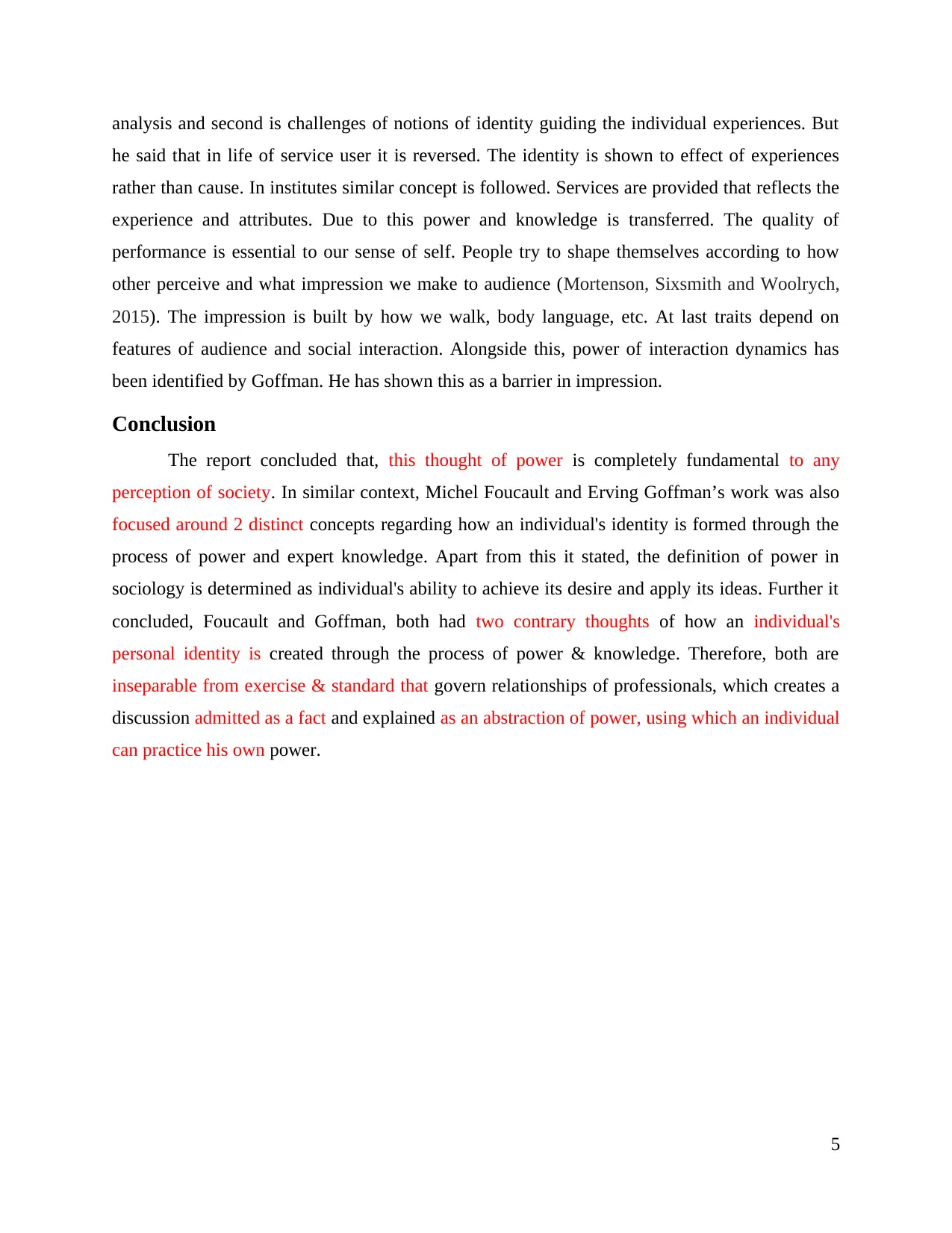
analysis and second is challenges of notions of identity guiding the individual experiences. But
he said that in life of service user it is reversed. The identity is shown to effect of experiences
rather than cause. In institutes similar concept is followed. Services are provided that reflects the
experience and attributes. Due to this power and knowledge is transferred. The quality of
performance is essential to our sense of self. People try to shape themselves according to how
other perceive and what impression we make to audience (Mortenson, Sixsmith and Woolrych,
2015). The impression is built by how we walk, body language, etc. At last traits depend on
features of audience and social interaction. Alongside this, power of interaction dynamics has
been identified by Goffman. He has shown this as a barrier in impression.
Conclusion
The report concluded that, this thought of power is completely fundamental to any
perception of society. In similar context, Michel Foucault and Erving Goffman’s work was also
focused around 2 distinct concepts regarding how an individual's identity is formed through the
process of power and expert knowledge. Apart from this it stated, the definition of power in
sociology is determined as individual's ability to achieve its desire and apply its ideas. Further it
concluded, Foucault and Goffman, both had two contrary thoughts of how an individual's
personal identity is created through the process of power & knowledge. Therefore, both are
inseparable from exercise & standard that govern relationships of professionals, which creates a
discussion admitted as a fact and explained as an abstraction of power, using which an individual
can practice his own power.
5
he said that in life of service user it is reversed. The identity is shown to effect of experiences
rather than cause. In institutes similar concept is followed. Services are provided that reflects the
experience and attributes. Due to this power and knowledge is transferred. The quality of
performance is essential to our sense of self. People try to shape themselves according to how
other perceive and what impression we make to audience (Mortenson, Sixsmith and Woolrych,
2015). The impression is built by how we walk, body language, etc. At last traits depend on
features of audience and social interaction. Alongside this, power of interaction dynamics has
been identified by Goffman. He has shown this as a barrier in impression.
Conclusion
The report concluded that, this thought of power is completely fundamental to any
perception of society. In similar context, Michel Foucault and Erving Goffman’s work was also
focused around 2 distinct concepts regarding how an individual's identity is formed through the
process of power and expert knowledge. Apart from this it stated, the definition of power in
sociology is determined as individual's ability to achieve its desire and apply its ideas. Further it
concluded, Foucault and Goffman, both had two contrary thoughts of how an individual's
personal identity is created through the process of power & knowledge. Therefore, both are
inseparable from exercise & standard that govern relationships of professionals, which creates a
discussion admitted as a fact and explained as an abstraction of power, using which an individual
can practice his own power.
5
Paraphrase This Document
Need a fresh take? Get an instant paraphrase of this document with our AI Paraphraser
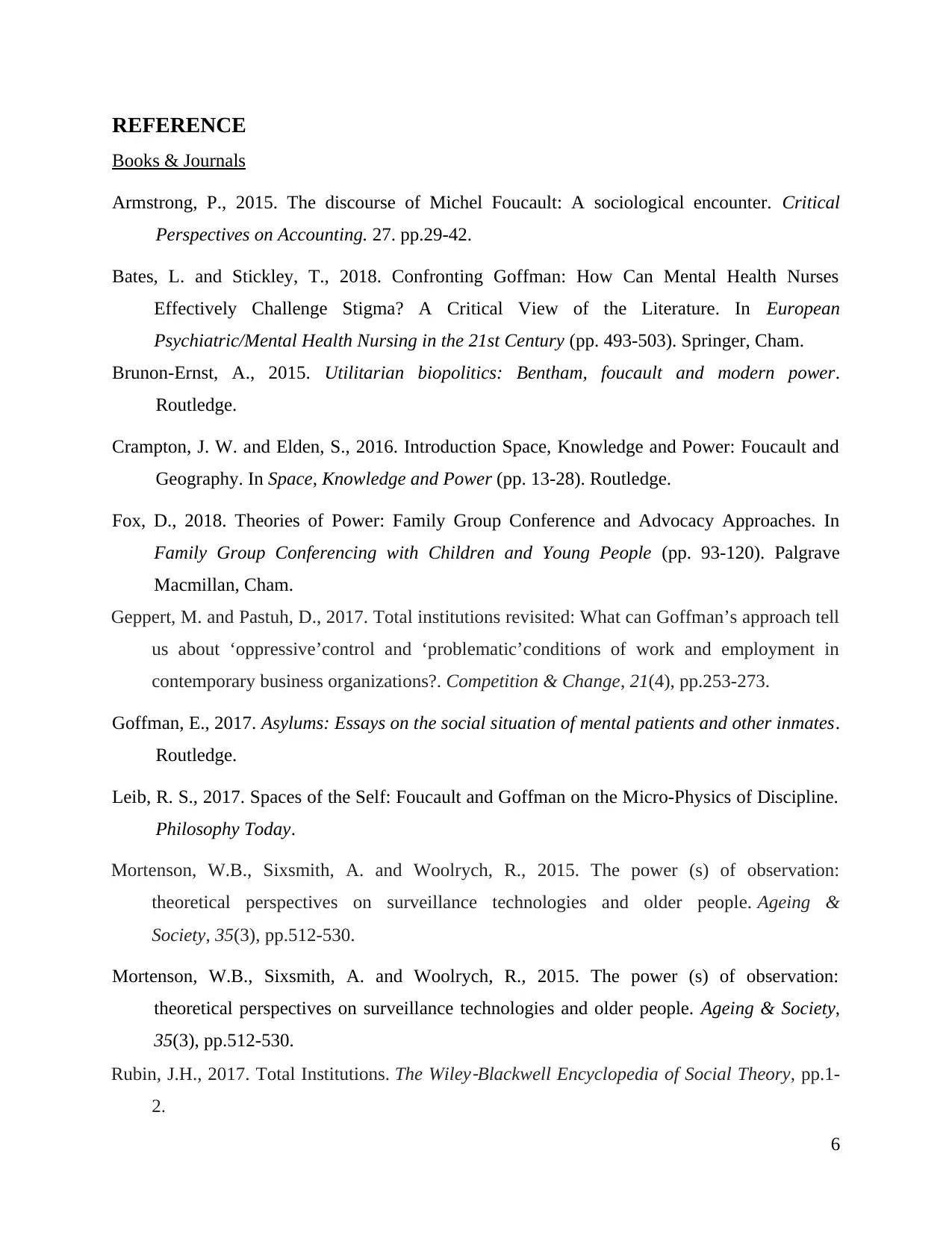
REFERENCE
Books & Journals
Armstrong, P., 2015. The discourse of Michel Foucault: A sociological encounter. Critical
Perspectives on Accounting. 27. pp.29-42.
Bates, L. and Stickley, T., 2018. Confronting Goffman: How Can Mental Health Nurses
Effectively Challenge Stigma? A Critical View of the Literature. In European
Psychiatric/Mental Health Nursing in the 21st Century (pp. 493-503). Springer, Cham.
Brunon-Ernst, A., 2015. Utilitarian biopolitics: Bentham, foucault and modern power.
Routledge.
Crampton, J. W. and Elden, S., 2016. Introduction Space, Knowledge and Power: Foucault and
Geography. In Space, Knowledge and Power (pp. 13-28). Routledge.
Fox, D., 2018. Theories of Power: Family Group Conference and Advocacy Approaches. In
Family Group Conferencing with Children and Young People (pp. 93-120). Palgrave
Macmillan, Cham.
Geppert, M. and Pastuh, D., 2017. Total institutions revisited: What can Goffman’s approach tell
us about ‘oppressive’control and ‘problematic’conditions of work and employment in
contemporary business organizations?. Competition & Change, 21(4), pp.253-273.
Goffman, E., 2017. Asylums: Essays on the social situation of mental patients and other inmates.
Routledge.
Leib, R. S., 2017. Spaces of the Self: Foucault and Goffman on the Micro-Physics of Discipline.
Philosophy Today.
Mortenson, W.B., Sixsmith, A. and Woolrych, R., 2015. The power (s) of observation:
theoretical perspectives on surveillance technologies and older people. Ageing &
Society, 35(3), pp.512-530.
Mortenson, W.B., Sixsmith, A. and Woolrych, R., 2015. The power (s) of observation:
theoretical perspectives on surveillance technologies and older people. Ageing & Society,
35(3), pp.512-530.
Rubin, J.H., 2017. Total Institutions. The Wiley
‐Blackwell Encyclopedia of Social Theory, pp.1-
2.
6
Books & Journals
Armstrong, P., 2015. The discourse of Michel Foucault: A sociological encounter. Critical
Perspectives on Accounting. 27. pp.29-42.
Bates, L. and Stickley, T., 2018. Confronting Goffman: How Can Mental Health Nurses
Effectively Challenge Stigma? A Critical View of the Literature. In European
Psychiatric/Mental Health Nursing in the 21st Century (pp. 493-503). Springer, Cham.
Brunon-Ernst, A., 2015. Utilitarian biopolitics: Bentham, foucault and modern power.
Routledge.
Crampton, J. W. and Elden, S., 2016. Introduction Space, Knowledge and Power: Foucault and
Geography. In Space, Knowledge and Power (pp. 13-28). Routledge.
Fox, D., 2018. Theories of Power: Family Group Conference and Advocacy Approaches. In
Family Group Conferencing with Children and Young People (pp. 93-120). Palgrave
Macmillan, Cham.
Geppert, M. and Pastuh, D., 2017. Total institutions revisited: What can Goffman’s approach tell
us about ‘oppressive’control and ‘problematic’conditions of work and employment in
contemporary business organizations?. Competition & Change, 21(4), pp.253-273.
Goffman, E., 2017. Asylums: Essays on the social situation of mental patients and other inmates.
Routledge.
Leib, R. S., 2017. Spaces of the Self: Foucault and Goffman on the Micro-Physics of Discipline.
Philosophy Today.
Mortenson, W.B., Sixsmith, A. and Woolrych, R., 2015. The power (s) of observation:
theoretical perspectives on surveillance technologies and older people. Ageing &
Society, 35(3), pp.512-530.
Mortenson, W.B., Sixsmith, A. and Woolrych, R., 2015. The power (s) of observation:
theoretical perspectives on surveillance technologies and older people. Ageing & Society,
35(3), pp.512-530.
Rubin, J.H., 2017. Total Institutions. The Wiley
‐Blackwell Encyclopedia of Social Theory, pp.1-
2.
6
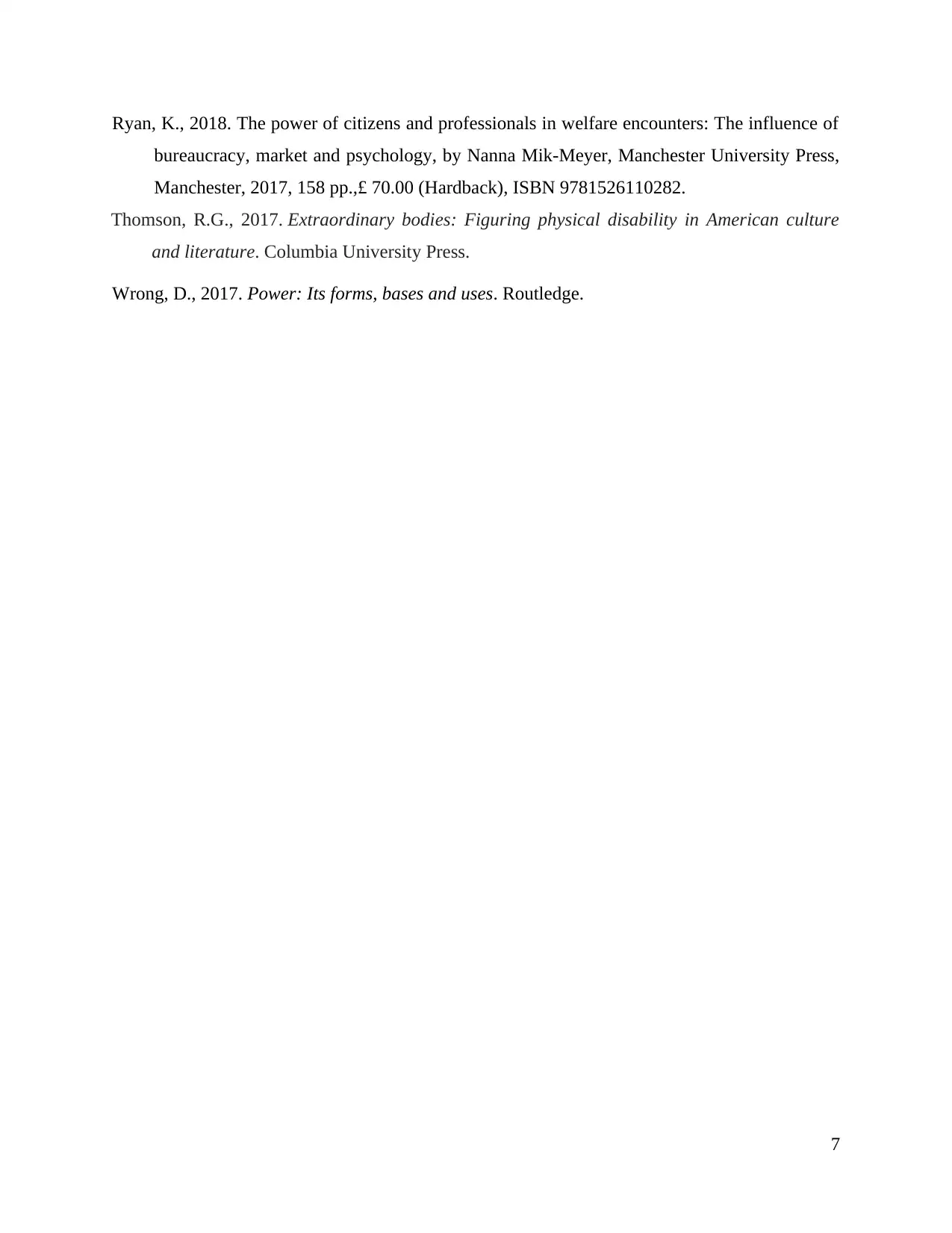
Ryan, K., 2018. The power of citizens and professionals in welfare encounters: The influence of
bureaucracy, market and psychology, by Nanna Mik-Meyer, Manchester University Press,
Manchester, 2017, 158 pp.,£ 70.00 (Hardback), ISBN 9781526110282.
Thomson, R.G., 2017. Extraordinary bodies: Figuring physical disability in American culture
and literature. Columbia University Press.
Wrong, D., 2017. Power: Its forms, bases and uses. Routledge.
7
bureaucracy, market and psychology, by Nanna Mik-Meyer, Manchester University Press,
Manchester, 2017, 158 pp.,£ 70.00 (Hardback), ISBN 9781526110282.
Thomson, R.G., 2017. Extraordinary bodies: Figuring physical disability in American culture
and literature. Columbia University Press.
Wrong, D., 2017. Power: Its forms, bases and uses. Routledge.
7
⊘ This is a preview!⊘
Do you want full access?
Subscribe today to unlock all pages.

Trusted by 1+ million students worldwide
1 out of 9
Related Documents
Your All-in-One AI-Powered Toolkit for Academic Success.
+13062052269
info@desklib.com
Available 24*7 on WhatsApp / Email
![[object Object]](/_next/static/media/star-bottom.7253800d.svg)
Unlock your academic potential
Copyright © 2020–2025 A2Z Services. All Rights Reserved. Developed and managed by ZUCOL.





